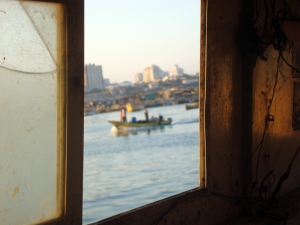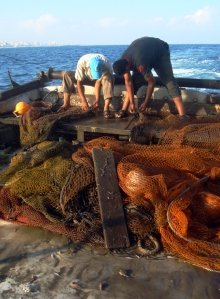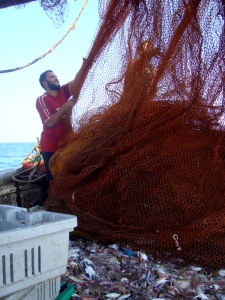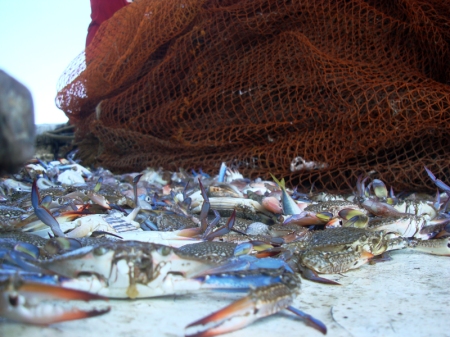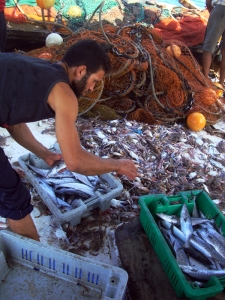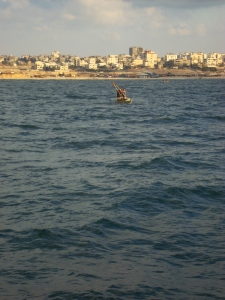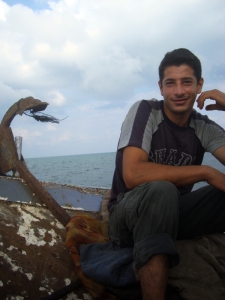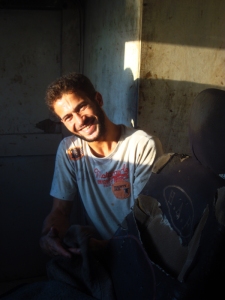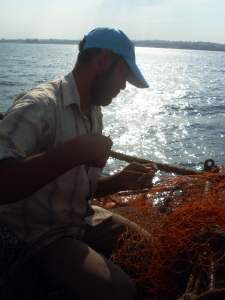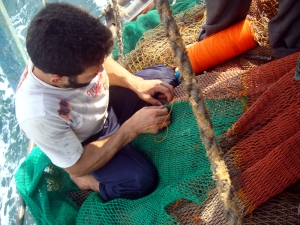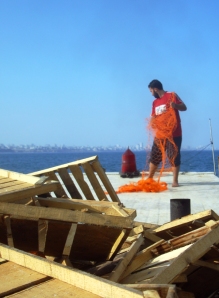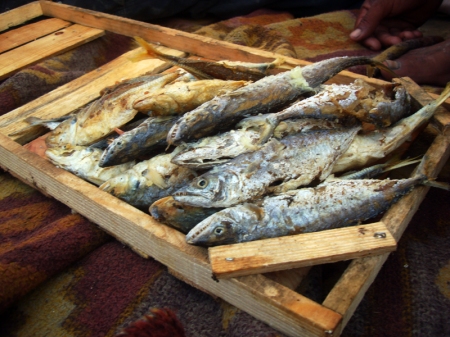In Gaza
*Palestinian fisherman repairs a net using old nets; new fishing nets are unavailable or highly expensive in Gaza under the Israeli-led siege
Palestinian fishermen and farmers are some of the livelier, slightly crazier, people I’ve met. Maybe it’s the constant exposure to the dangers of Israeli shooting and shelling. Come to think of it, Palestinian medics share these dangers and this zaniness as well.
Fishermen have little to no other option but to risk the assault of the IOF gunboats as they fish in their own waters. But they do it with flair.
F. is the liveliest of today’s crew. Mischievous, with endless energy, he captains the boat and jumps in to help with the different tasks on board.
We head north, not far out from the coast, maybe 2 km (they would go deeply were the 20 nautical mile fishing limits respected by Israeli gunboats; instead, Israeli gunboats –through shelling, shooting, water cannons, and abductions of fishermen –impose their own unilateral limitations –from high up, to be certain –of 3 miles, cutting down boats even within that 3 mile limit).
The boat is a trawler, maybe 15 metres long, fitted with a pulley system allowing their nets to be dropped into waters over 200m down. After dropping, the boat will saunter for a while, picking up fish as it moves back south. Nets will be hauled in, and a sad catch* will be sorted on deck, neatly packaged in plastic containers and stowed away, and the process will begin anew.
In the 12 hour shift they’ll drop their nets about 4 times, if they are not first stopped by Israeli gunboat shooting or shelling [just last week, an Israeli gunboat fired heavily at a Palestinian trawler, finally shelling it and causing it to catch afire, burning it completely. The trawler is destroyed]. They will actually stay out 24 hours, but this novice seafarer can handle only 12 for the time.
At the northern end, we see the smokestacks of industry (functioning, as opposed to Gaza’s, which under the recent Israeli massacre and the Israeli-led siege has seen 95% collapse, meaning more jobless turn to the seas, meaning more overfishing in a limited area…) in Ashdod. The towers mark the land where life flows without siege, naval attacks, air raids…
It’s always strange to see the built-up areas of Israel just beyond Gaza’s ravished northern border. From a once-lush land holding different fruit and olives trees but now dustily near-barren, void of most structures (see piles of rubble) one’s eye travels past the industrial area proximate to Gaza,to the high-rise apartments along Israel’s coastline.
It’s strange also to realize, internalize, just how small Gaza is. So much happens to so many people in such an unbelievably tiny Strip.
To the east, a pair of hassaka fishermen paddle their light craft out, readying to drop their nets and make a go of fishing another day. Last week, on August 27, a fisherman swimming out to drop a net was shelled by an Israeli gunboat. The shell tore his head off.
Nets dropped, A. takes a break, sprawls on the deck, sings a little, and smiles a lot. “Bumoot fil bahar,” he says ['I love the sea to death'].
H. is quieter, but still has the same devilish smile and laughter they all share.
I realize F. reminds me of one of the medics I worked with during the Israeli massacre of Gaza. Same haphazard ‘whatever happens, happens’ attitude. Same generous smile. He leans back, steers with his feet, lights a cigarette and drinks the coffee H. has just made for us (it’s Ramadan, but many, although strong believers, aren’t fasting. It’s hard work, long hours, and many decide they’d rather eat, drink, smoke and have energy than be overly devout).
Then they’re up again, onto the roof, working again. F. is repairing a gutted net, using bits of other unusable nets to patch it up. A. is creating a new net, deftly weaving his net needle in patterns ingrained in his mind and muscle memory.
The nets are pulled in again. It takes a good 10 minutes, with F. running from winch motor to rope cables, making sure things go smoothly.
It’s easy to understand why fishermen are so vulnerable when nets are down. Expensive and difficult to replace, you don’t want to cut them. But when the IOF begin intensely shooting, the fishermen sometimes have to drop their nets.
Finally the nets appear. F. is in the middle, watching the catch come in. He turns with a mock spit of disgust: a small catch.
I snooze on the deck, nice breeze, sunshine, and wake up some time later to the shots. The gunboat is still far away, and the shots are half-hearted, not close this time. A few lame shells follow, but also are far enough away. It’s hit and miss with the IOF gunboats; they are unpredictable, and the fishermen know this. But with so little fishing space, the Israeli authorities having imposed their down-sized limits on Palestinians, the fishers push these limits, go to the edges and corners. After all, its still their waters, beyond the ‘limits’ is still their sea.
In my napping I’ve had a blanket put over me, and as it is hot, I shrug it off while dozing. It is twice replaced by unseen, caring hands.
In the cabin, F. is finishing some fool (beans) and offers me a piece of bread and glass of tea. He is buzzing with energy and begins to dance to the radio, finally leaning out the front window with a grin, eyes closed in the breeze. He relishes the sea, his work, the freedom (downsized and shot up as it is).
The day continues with net drops and sparse catches, much teasing among the five fishers, all good-natured and giddy.
Always, as we trawl, there are a few other fishing boats near us, going through the same routine, likely the same antics on board.
F. has fished for fifteen years and remembers the days when they went deeper, were actually out at sea, fished without other boats around. There is affection among most of the fishermen, and they watch out for one another when the IOF gunboats attack. But they used to roam further and, consequently, not tap the same sources repeatedly.
A. has broiled fish and brings the crate of delicacies out for all to share, with bread.
Sunset comes, we head south to the Gaza harbour, they drop us and ready to head back out for their night in southern waters: it’s shrimp time.
We wish each other well and plan the next trip; M. is determined to bring some vegetables for me, noting my vegetarian tendencies, and wants to know exactly what day I’ll come so he can prepare.
These men, giving, crazy, working hard, laughing hard…I will think of them from the land, particularly when the IOF shelling and gunfire ring out.
*[A December 2008 article noted this about the decline of the Palestinian fishing industry:
"The United Nations estimates that a distance of 12-15 nautical miles off Gaza is the minimum required to access the larger shoals of fish for maximum economic benefit.
Due to over-fishing in shallow waters, the stocks of smaller fish closer to shore have almost been depleted without having the chance to reproduce. The more lucrative shoals of tuna are also found further out.
The cost of one fishing trip can vary between 125 and 625 dollars, depending on the size of the vessel, nets and crew, and many fishermen cannot cover their costs from the resulting catch. They have no option but to remain on shore.
Collectively, Palestinian fishermen saw their monthly catch drop from 823 tons in June 2000 to as low as 50 tons in late 2006, according to the UN."]




